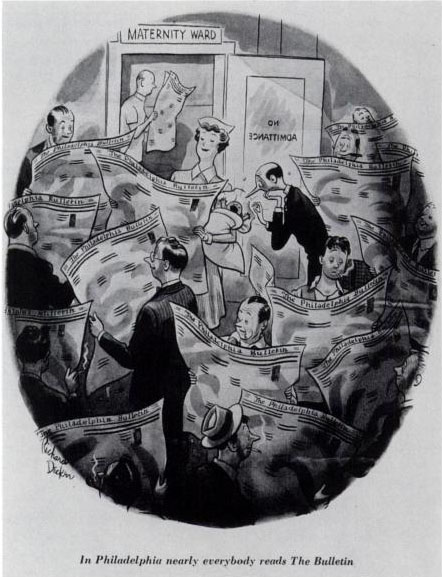July 21, 2007
Everybody in Philadelphia
From Philip Stevick, Imagining Philadelphia, 1996:
For many years in the forties and fifties, the New Yorker ran an advertisement, its format resembling a full-page New Yorker cartoon. It was always drawn by Richard Decker. Its medium was always the same: a public scene rendered in ink and wash. And the caption never varied. "In Philadelphia," it said in bold italics at the bottom, "nearly everybody reads the Bulletin." So like a New Yorker cartoon these drawings appeared to be that the magazine saw fit to clarify the intent by printing "Advertisement" in parentheses below the caption.
I remember being impressed by several of these advertisements when I was a child of two or three. Here's one that ran when I was two, in the issue of March 18, 1950:

Stevick describes another from the same year:
In the February 4 illustration, the view is of a theater, from the rear, looking up the center aisle toward the stage, on which an actor and an actress are in postures suggesting the possibility of high romantic emotion, except that both of them are reading the Philadelphia Bulletin. In the seats of the theater are the patrons; one sees the backs of their heads. But instead of watching the action on stage, each one is holding the Philadelphia Bulletin. Only a single figure, the familiar man in the black suit, with the long nose and the bald head, leans into the aisle from his seat, attempting to see the action on the stage, not an easy thing to do since his view is blocked by every else's newspaper.
As Stevick observes,
...what is most likely to strike a reader of those advertisements at our distance from them is the uncompromisingly derogatory view that they carry of life in Philadelphia. Faced with the unexpected, or the dramatic, or the exciting, or indeed the life-threatening, Philadelphians, the ads seem to say, cannot be roused from their daily papers. It is the evening Bulletin that provides all the engagement with life that Philadelphians can stand. Experience itself if simply not interesting. [...]
Yet there is something oddly compelling about those ads. One's ability, now, to respond to such a quality depends on a willingness to take them as occupying a plane that their creators surely never intended them to occupy. They are, in some quite convincing sense, night scenarios.
At the age of two, I accepted without question that illustrations like these, glimpsed in adult books and magazines, depicted the world as it was. Maybe not in Mansfield, Connecticut; but somewhere.
The Bulletin went out of business in 1981, several years before I ever visited Philadelphia. But today I finally caught a glimpse of Richard Decker's dreamtime city. In Philadelphia, nearly everybody was reading Harry Potter and the Deathly Hallows.
As I sat at outdoor cafe table, five of the seven occupied tables were occupied by people engrossed in the book. Someone else, standing propped against a lamppost, was about half-way through it. As I walked west on Walnut St., I nearly collided with two pedestrian readers. At the market, I saw several other people reading copies propped on the handles of their grocery carts, as they plucked items absently from the shelves in passing.
[I'm sure that these folk were all absorbed in the story, but somewhere, scholars are patiently compiling notae variorum, to add to the lists compiled for the earlier volumes in the series:
Harry Potter and the Philosopher's Stone / Sorcerer's Stone
Harry Potter and the Chamber of Secrets
Harry Potter and the Prisoner of Azkaban
Harry Potter and the Goblet of Fire
Harry Potter and the Order of the Phoenix
Harry Potter and the Half-Blood Prince
There are some interesting nuggets in this collection. For example, p. 558 of the British edition of Harry Potter and the Half-Blood Prince apparently has
one of the fighters detached themself
where the corresponding sentence in the American edition, on p. 598, reads
one of the fighters detached themselves
Curiouser and curiouser, as Alice said to her feet.
Arnold Zwicky discussed this issue (in general, not in the works of Ms. Rowling) in an earlier Language Log post: "Themself", 3/8/2007.
]
[Hat tip to Daniel Reeves for the differences pages]
Posted by Mark Liberman at July 21, 2007 07:19 PM